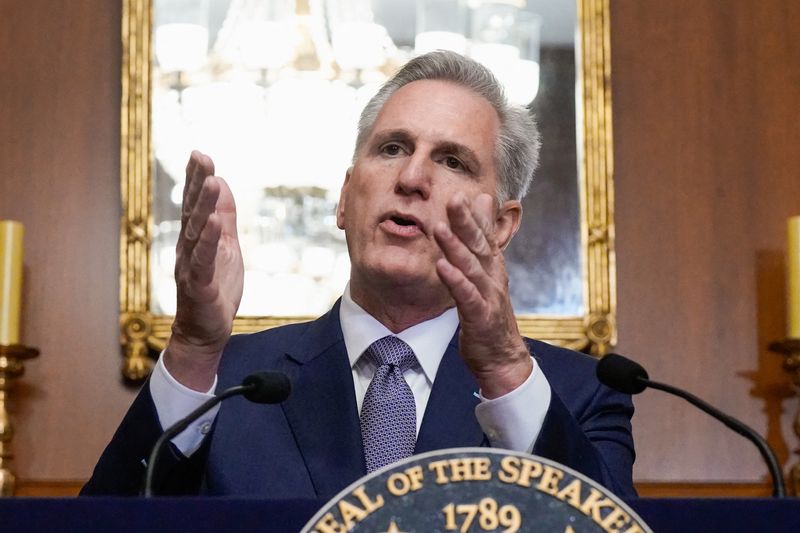WASHINGTON (Reuters) -Republican U.S. House of Representatives Speaker Kevin McCarthy faces an attempt by members of his own party to oust him because he passed a stopgap funding measure with Democratic support to avoid a government shutdown.
Representative Matt Gaetz, a hardline Republican lawmaker, said he would file what's called the "motion to vacate."
WHAT IS THE MOTION TO VACATE?
The motion to vacate is the House's procedure to remove its speaker. The chamber's current rules allow any one member, Democrat or Republican, to introduce the motion. If it is introduced as a "privileged" resolution, the House must consider it at some point, although it could be delayed with procedural votes.
If the motion to vacate comes to the House floor for a vote, it would only need a simple majority to pass. Republicans currently control the House with 221 seats to 212 Democrats, meaning if McCarthy wants to keep his speaker's gavel, he cannot afford to lose more than four votes.
HOW CAN A SINGLE MEMBER BRING A MOTION TO VACATE?
McCarthy endured a brutal 15 rounds of voting in January before being elected as speaker, during which he agreed to multiple concessions increasing the power of Republican hardliners.
One was the decision to allow just one member to put forward a motion to vacate, which meant that hardliners could threaten McCarthy's speakership at any time.
This was a change from the rules in place under his Democratic predecessor, Nancy Pelosi, when a majority of one party needed to support a motion to vacate to bring it to the floor.
WHO HAS BEEN TALKING ABOUT FILING A MOTION TO VACATE?
Republican Representative Gaetz, a firebrand from Florida and perpetual thorn in McCarthy's side, has repeatedly threatened to file a motion to vacate. The speaker has been unfazed.
In a Sept. 14 closed-door meeting of House Republicans, McCarthy dared Gaetz to bring a motion to the floor.
Others including Representatives Dan Bishop and Eli Crane have also suggested they would support a motion to vacate.
HAS THE MOTION TO VACATE BEEN USED BEFORE?
The motion was first used in 1910, when then-Republican Speaker Joseph Cannon put forward the motion himself to force detractors in his own party to decide whether they supported him or not, according to the House Archives. The motion failed.

Then-Republican Speaker Newt Gingrich was threatened with a motion to vacate in 1997. Although he managed to tamp down resistance and avoid an actual resolution being filed, he resigned in 1998 after disappointing results in the midterm elections that year.
Republican then-Representative Mark Meadows in 2015 filed a motion to vacate against Republican Speaker John Boehner. It did not come to a vote, but Boehner resigned anyway a few months later, citing the challenges of managing a burgeoning hardline conservative faction of his party.
